Here we go again. As the NHL’s 2018-19 regular season ended, the merry-go-round ride of coaches has already started. Almost half of the 14 teams that failed to qualify for the postseason are likely getting new coaches. This includes five teams with interim coaches that took over during the season.
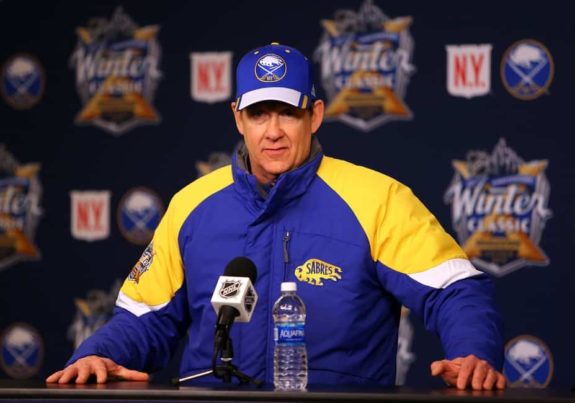
Seven head coaching gigs have or will likely open up: Anaheim Ducks (interim coach Bob Murray), Buffalo Sabres, Edmonton Oilers (interim coach Ken Hitchcock), Florida Panthers, Los Angeles Kings (interim coach Willie Desjardins), Ottawa Senators (interim coach Marc Crawford) and Philadelphia Flyers (interim coach Scott Gordon).
After a slow start, Craig Berube took over for Mike Yeo of the St. Louis Blues and guided them into the playoffs. Short of a quick first-round exit against the Winnipeg Jets, he’s likely keeping his job.
Coach Q Lands in Florida
One head coaching vacancy has already been filled. Joel Quenneville has taken over as head coach of the Florida Panthers, replacing Bob Boughner. The three-time Stanley Cup champion hopes to guide the Panthers, who have missed the playoffs in six of the last seven seasons, to a brighter future.
“I believe this team is close to winning,” said Coach Q. “I was fortunate–luckiest guy in the world–when I walked into the Chicago situation there, a team ready, sitting on go to win. I feel the same here now.”
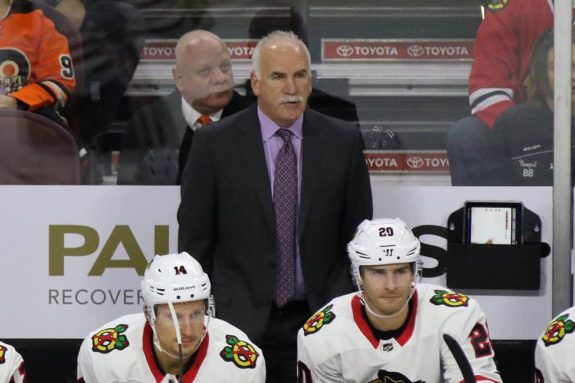
Quenneville, who is second on the NHL’s career victory list, is reunited with Panthers General Manager Dale Tallon who hired him to coach the Chicago Blackhawks in 2008 and wound up watching him win three Stanley Cups there in a span of six seasons.
Available coaches include: Jack Capuano, Marc Crawford, Dallas Eakins, Scott Gordon, Dave Hakstol, Bob Hartley, Kris Knoblauch, Mike Yeo and Alain Vigneault.
Does Coaching Matter?
Coaching styles vary. Some scream. Others speak with few words and have an intimidating presence. When a team is winning, they can be a player’s friend; when losing, their worst enemy. The planning and scheming are very similar in the league as it continues to emphasize speed and transitioning out of the defensive zone.
Stanley Cup winner and former Sabres and Montreal Canadiens captain, Brian Gionta went on the record saying systems don’t really matter in the NHL, (from ‘Sabres need to get something out of their system’, Buffalo News – 2/13/17). Most teams plan similarly with only small differences in forechecking and defensive schemes. Gionta should know, too. He played for 11 different coaches in his 16-season, four-team career. But that’s only one point of view.
The Trotz Effect
Barry Trotz’s system and his roster’s buy-in has transformed the New York Islanders into a top-notch team. With no significant upgrade over last season’s blueliners, his scheme dramatically limits opponents’ chances in the slot –a key indicator for success. The results prove it.
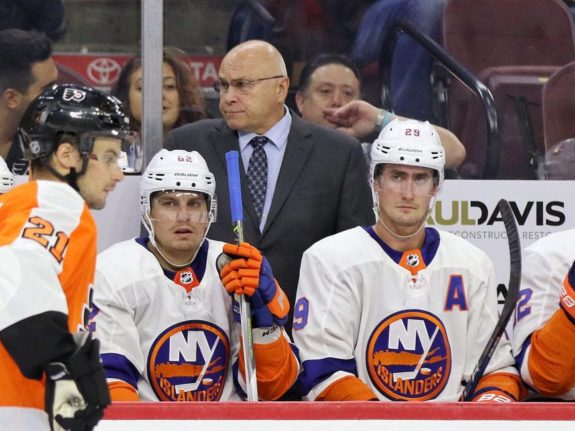
Trotz’s system also closes the gap and on attacking players, reduces their zone entry efficiency and protects their blue line. Last season, the Isles were 29th in zone entry denial rate, rush chances against and offsides forced. This season, they were in the top ten in every category.
What really separates coaches, far beyond their X’s and O’s, is their ability to get the most out of each one of their players and their ability to motivate each individual to play their role at its highest level. All the cast-offs who felt discarded in the Vegas Golden Knight expansion draft were motivated by the brotherhood of “I’ll-show-you-ism.”
A good coach finds a hook to motivate like that. A good coach motivates and finds a way to glue everyone together as a team; makes each player feel like they are vital, whether on the first line or fourth, and that they belong.
Coaching Schemes
Perennial playoff contenders like the Pittsburgh Penguins, Washington Capitals and Boston Bruins make the playoffs not because of their system, but because of how they play within it.
When players veer from the system, it hurts the team. Going off script, being out of position or failing to cover a man can quickly lead to a goal in their net.
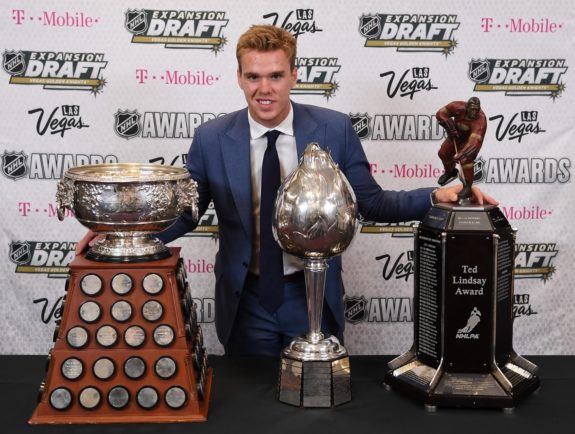
Hockey is a sport that relies on a full team effort. Just look at Connor McDavid’s trophy collection versus his playoff wins. It’s proof that one player, regardless of how elite, can only carry a team so far. At most, he’s on the ice half of the game. Even with two 100-point players (McDavid and Leon Draisaitl), a good season from Ryan Nugent-Hopkins and Darnell Nurse and more, the Oilers played as a bunch of individuals counting on their stars to get the job done. It’s not enough to win in this league.
Coaching Experience
Coaching changes are frequent in the NHL. General managers often survive the turnover of their bench boss. Coaches are usually scapegoats for a GM’s poorly constructed roster. Then again, a coach may not have what it takes at the NHL level (See: Rolston, Ron) or they may have a stale message. Coaches set the tone in practice, design a game plan on any given night and hold players accountable.
It’s a lot easier to fire a coach than fire half of an under-performing team. This NHL is a what-have-you-won-for-me lately league; a results-based business. Owners are members of the good old boys club and want bragging rights in addition to a return on their investment. Though they’re mostly millionaires, if not billionaires, they often see their teams as extensions of their persona and, therefore, want a contender. Their team is not just a business investment, it’s a source of pride.
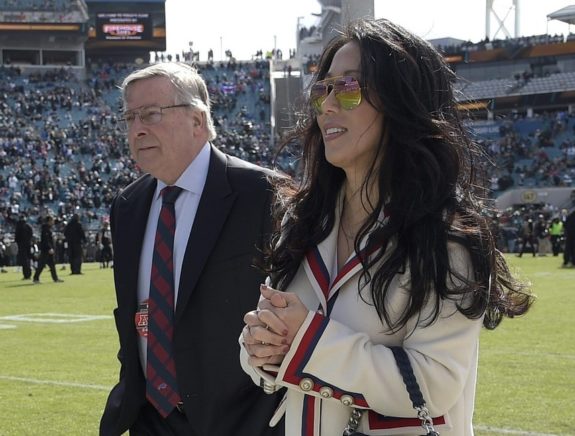
Since purchasing the Sabres in 2011, Terry and Kim Pegula have fired Lindy Ruff, Ron Rolston, Ted Nolan, Dan Bylsma and Phil Housley. The team now holds the longest playoff drought in the NHL at eight years.
After Trotz coached the Washington Capitals to a Stanley Cup, he sought a new deal worth $5 million per season for five seasons. The five-year term was a deal-breaker for Capitals ownership, in light of the short shelf life of NHL coaches and the fact he’d already spent four seasons behind the bench. Trotz rightfully wanted to be paid top coach money. He found that three days later on Long Island with the New York Islanders.
“It’s good to be wanted,” said Trotz after inking his new deal. “It happened really quickly because you go from one emotion of winning the Cup to the next emotion of leaving the team that you just won the Cup with, and you have to make some quick decisions.”
The NHL’s Coaching Carousel
New, first-year coaches aren’t the norm in the NHL. Some coaches work their way up the ranks, advancing from the AHL to the NHL. More often than not, once a coach has spent a few years in the bigs, they get several kicks at the can. An exception is Tampa Bay Lightning coach Jon Cooper who has coached all 508 games with the Lightning and has had tremendous success.
It’s dizzying to follow the paths of some of the NHL’s most experienced coaches.
Claude Julien coached the Canadiens for three seasons, then became head coach of the New Jersey Devils for a season before jumping behind the Boston Bruins’ bench for ten years. He then went back to Montreal for three more seasons.
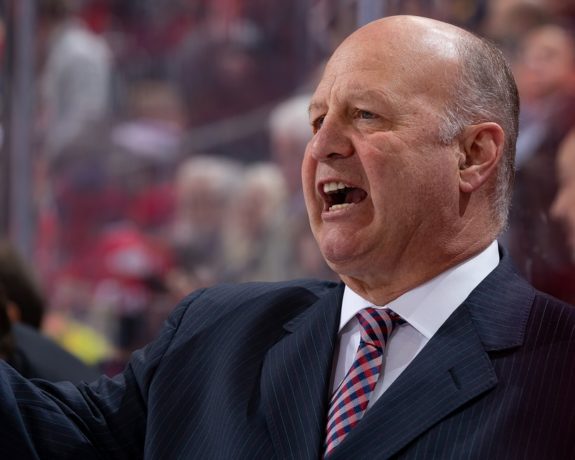
Michel Therrien coached the Habs for three seasons, before being named head coach of the Penguins for four seasons. He then returned to Montreal for another five seasons with the Canadiens.
Alain Vigneault coached the Montreal Canadiens for four years before taking the helm of the Vancouver Canucks. There, he led the team to five consecutive division titles before he was fired and replaced by New York Rangers coach John Tortorella.
Vigneault took Tortorella’s job coaching the Blue Shirts for five years. Previously, Tortorella had coached the Tampa Bay Lightning for seven seasons, including a Stanley Cup in 2003-04. Torts lasted one season in Vancouver before joining the Columbus Blue Jackets.
Ken Hitchcock has coached for the Dallas Stars, Philadelphia Flyers, Columbus Blue Jackets, St. Louis Blues, again for the Stars and finished this season with the Edmonton Oilers.
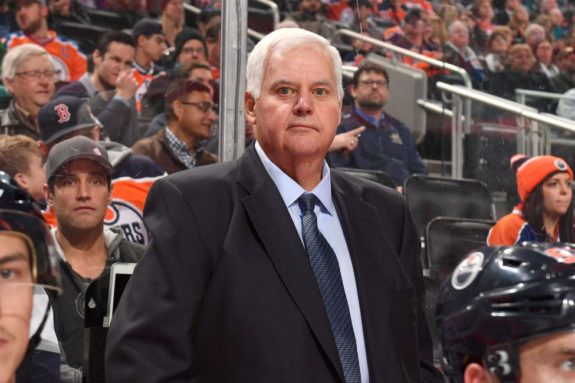
When Hitchcock was fired in St. Louis, he was replaced by Mike Yeo who had been with the Minnesota Wild for five seasons. Hitchcock’s second stint with the Stars came when Lindy Ruff left for the New York Rangers.
Similar storylines can be told for Todd McLellan (has coached for two teams), Bruce Boudreau (three teams), Paul Maurice (four teams), Marc Crawford (six teams), Barry Trotz (three teams) and many others.
The Pressure Is on the Coach
Hiring an experienced coach is a safer bet for a GM and an easier sell to an owner. In addition to placing more of the burden for success on the coach, it relieves some of the pressure on them to build the right roster while adding a touch of job security.
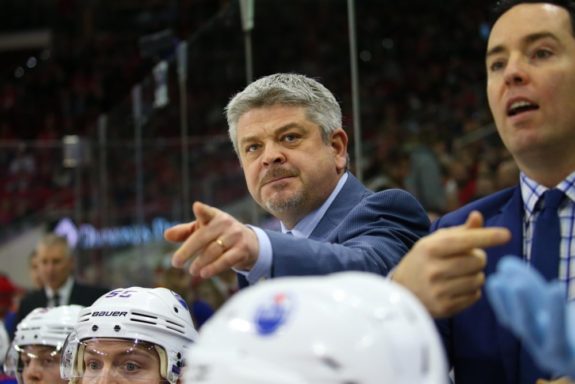
Experienced coaches aren’t all winners. After all, the reason they’re available is they’re usually fired after failing at some point or points in their careers. It’s a roller coaster ride of ups and downs, with new teams snatching them up in hopes of recapturing the highs.
Beyond entertainment, the NHL is a results-driven business. There will always be winners and losers. It’s a dizzying ride for coaches.